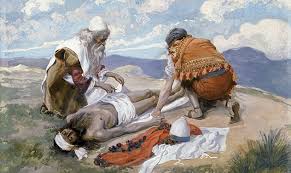Aaron’s Sacred Garments Will Belong to His Descendants
So They Can Also Be Dedicated
29: 29-30
Aaron’s sacred garments will belong to His descendants so they can be ordained DIG: How was succession done in a solemn and yet respectful way? How did anyone know it was time for the transference to take place? How did the people respond?
REFLECT: Do you desire a succession of ministry, lay or professional, in your own family? What would it mean for you to have your children continue on with God’s work in their own unique way? Aaron had four sons, two continued the succession as priests and God killed two because of disobedience. Can you identify with that joy or that sorrow within your own family?
Every time a new high priest was dedicated in the future, he was to wear Aaron’s sacred garments. They were unique to him, and would belong to his descendants so that they could also be anointed and dedicated in them. The son who succeeded him as high priest and came to the Tabernacle to minister in the Holy Place was to wear them for the seven days of the dedication ceremony. The number seven, of course, symbolizes completion. The first dedication service was to set the pattern for all such future services. It was to continue to be seven days in length, and only the high priest was to be given such an elaborate ceremony.646

When Aaron was about to die, ADONAI commanded Moses His servant, saying: Get Aaron and his son Eleazar and take them up Mount Hor. Remove Aaron’s garments and put them on his son Eleazar, for Aaron will be gathered to his people and he will die there. Moses did as ADONAI commanded. They went up Mount Hor in the sight of the whole community. Moses removed Aaron’s garments and put them on his son Eleazar. And Aaron died there on top of the mountain. Then Moses and Eleazar came down from the mountain, and the whole community learned that Aaron had died, the entire house of Isra’el mourned for him thirty days (Numbers 20:25-29). The transference of the holy clothes was the symbol of the succession of the priesthood.
God not only cared for Isra’el’s immediate existence, He was also concerned for their posterity. Therefore, He gave instructions regarding the succession of the priesthood. Once at a dinner, Queen Victoria asked John Bright, “Where did all these learned men come from?” Bright answered immediately, “They came from babies!” The queen burst into laughter, but she got the point. Learned men do not merely appear, they must be brought up and groomed for the positions they are to fulfill. And that is how God dealt with Isra’el, the future priesthood needed to know the ways of the priesthood and the way of succession.
The same must be true for the Universal Church today, made up of Jews and Gentiles (Ephesians 2:14). We must be concerned about it and its leadership. We must train men and women well and early for positions of leadership. We must be clear what is to be expected of them. If we do that, then we can pass the Church into capable hands. Let us not only live in the here and now, but in the eternal community of believers.647



Leave A Comment